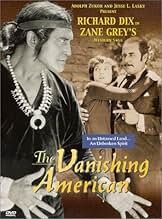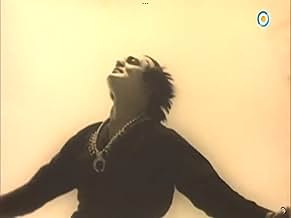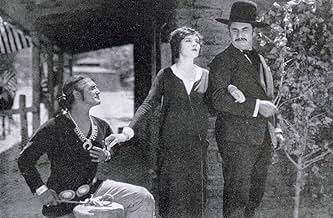अपनी भाषा में प्लॉट जोड़ेंA Navajo tribe suffers mistreatment by an Indian-hating agent who steals their horses. When WWI breaks out, a teacher convinces the tribe leader that enlisting will lead to better treatment.A Navajo tribe suffers mistreatment by an Indian-hating agent who steals their horses. When WWI breaks out, a teacher convinces the tribe leader that enlisting will lead to better treatment.A Navajo tribe suffers mistreatment by an Indian-hating agent who steals their horses. When WWI breaks out, a teacher convinces the tribe leader that enlisting will lead to better treatment.
- पुरस्कार
- कुल 2 जीत
John Webb Dillion
- Naylor
- (as John Webb Dillon)
Gary Cooper
- Extra
- (बिना क्रेडिट के)
George Magrill
- The First Nophaie
- (बिना क्रेडिट के)
कहानी
क्या आपको पता है
- ट्रिवियाThe legend that John Ford "discovered" Monument Valley (or John Wayne did and Ford took credit for it), or Harry Goulding (the trading post owner there) introduced Ford to this unique location in 1938 for Stagecoach (1939), is disproved by the fact that this movie was filmed there in 1925.
- कनेक्शनFeatured in The House That Shadows Built (1931)
फीचर्ड रिव्यू
This excellent movie far transcends its own genre, with a resourceful and detailed production that makes for a worthy treatment of some thought-provoking themes. Adapted from the Zane Grey novel, it easily does justice to the interesting story, but it is much more than just a good melodrama. Ambitous in its scale, in its time-span, and in its themes, it puts the main story into a context that is as interesting to watch as it is challenging to many of the common conceptions about the history of the American West.
The main story features Richard Dix as a Native American on a reservation, who must contend with a wide range of persons from the 'white' races. Dix succeeds in making his character interesting, believable, and sympathetic. In particular, he does well with portraying the inner torment and longings of a perceptive and capable man who is forced by his environment to keep a lot of things inside.
The 'white' characters work well, and they are well-chosen so as to avoid a simplistic portrayal of those who went west. Noah Beery plays the villainous Booker effectively, making his ill intentions clear even when his character is at his most charming, yet at the same making it believable that such a reprehensible character could so often gain the upper hand. Lois Wilson is rather meek, but she works well with Dix in the relationship that is at the center of the story.
All of that would be good enough (and it doesn't even mention the beautiful scenery and photography in Monument Valley), but what makes the movie even better is that it is set in a broader context, which places the lengthy, heart-rending clash of cultures in the American West into a sweeping, far more comprehensive picture of the unending struggle of human cultures and societies as they rise and fall through the centuries. It balances a number of perspectives, and believably shows how complex the interplay between different cultures can be.
The lengthy prologue, often detailed and interesting in itself, paints a convincing and often harrowing picture of the nature of human societies in their struggles and rivalries through the ages. It adds a depth rarely seen to the eventual conflicts between the expanding USA and the Native American nations, and even if it were made today, it would be a bold statement that challenges stereotypes of all kinds. True indeed is the movie's theme that human cultures come and go, and that those standing strong today will someday pass away, with only the earth itself remaining always.
This movie surely deserves to be much better-known, for its top quality production of some often challenging material, its interesting story, and its themes that are worthy of careful and honest consideration. If it were filmed today, some of the details would probably be handled differently, but that is to a large degree a matter of style or fashion. The specific details are far less important than the movie's impressive depth and quality.
The main story features Richard Dix as a Native American on a reservation, who must contend with a wide range of persons from the 'white' races. Dix succeeds in making his character interesting, believable, and sympathetic. In particular, he does well with portraying the inner torment and longings of a perceptive and capable man who is forced by his environment to keep a lot of things inside.
The 'white' characters work well, and they are well-chosen so as to avoid a simplistic portrayal of those who went west. Noah Beery plays the villainous Booker effectively, making his ill intentions clear even when his character is at his most charming, yet at the same making it believable that such a reprehensible character could so often gain the upper hand. Lois Wilson is rather meek, but she works well with Dix in the relationship that is at the center of the story.
All of that would be good enough (and it doesn't even mention the beautiful scenery and photography in Monument Valley), but what makes the movie even better is that it is set in a broader context, which places the lengthy, heart-rending clash of cultures in the American West into a sweeping, far more comprehensive picture of the unending struggle of human cultures and societies as they rise and fall through the centuries. It balances a number of perspectives, and believably shows how complex the interplay between different cultures can be.
The lengthy prologue, often detailed and interesting in itself, paints a convincing and often harrowing picture of the nature of human societies in their struggles and rivalries through the ages. It adds a depth rarely seen to the eventual conflicts between the expanding USA and the Native American nations, and even if it were made today, it would be a bold statement that challenges stereotypes of all kinds. True indeed is the movie's theme that human cultures come and go, and that those standing strong today will someday pass away, with only the earth itself remaining always.
This movie surely deserves to be much better-known, for its top quality production of some often challenging material, its interesting story, and its themes that are worthy of careful and honest consideration. If it were filmed today, some of the details would probably be handled differently, but that is to a large degree a matter of style or fashion. The specific details are far less important than the movie's impressive depth and quality.
- Snow Leopard
- 8 फ़र॰ 2005
- परमालिंक
टॉप पसंद
रेटिंग देने के लिए साइन-इन करें और वैयक्तिकृत सुझावों के लिए वॉचलिस्ट करें
विवरण
बॉक्स ऑफ़िस
- US और कनाडा में सकल
- $2,86,809
- चलने की अवधि1 घंटा 50 मिनट
- ध्वनि मिश्रण
- पक्ष अनुपात
- 1.33 : 1
इस पेज में योगदान दें
किसी बदलाव का सुझाव दें या अनुपलब्ध कॉन्टेंट जोड़ें

































